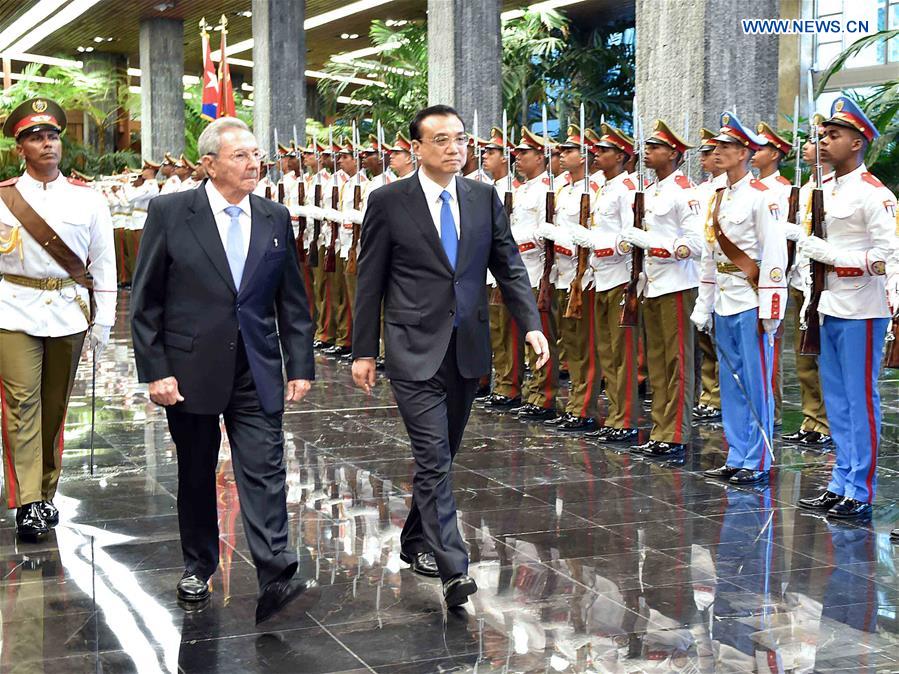Premier Li's visit to Cuba and the US factor
- By George N. Tzogopoulos
 0 Comment(s)
0 Comment(s) Print
Print E-mail China.org.cn, September 25, 2016
E-mail China.org.cn, September 25, 2016
|
|
| Cuban President Raul Castro holds a welcoming ceremony for Chinese Premier Li Keqiang (R) before their talks in Havana, Cuba, Sept. 24, 2016. Chinese Premier Li Keqiang held talks with Cuban President Raul Castro at the Palace of the Revolution in Havana on Saturday. (Xinhua/Li Tao) |
The visit of Premier Li Keqiang to Cuba can be seen against a backdrop of the Chinese administration's desire to maintain good relations and further improve ties with the whole region of Latin America in which harmonious economic cooperation is indicative.
According to the Chinese Ministry of Commerce, trade between the two sides was worth US$236.545 billion in 2015. In the same year China's non-financial direct investment flow to Latin America was worth of US$21.46 billion and the contract amount signed by Chinese enterprises for projects in the region reached US$18.16 billion.
In regard to Cuba, the trade volume was approximately US$2 billion in 2015. China is Cuba's second largest regional partner after Venezuela and Cuba is China's largest trading partner in the Caribbean region. China exports manufactured goods and imports raw materials such as sugar, nickel and oil. There is a mutual interest for more business in the fields of technology, financing, industrial capacity, quality control and environmental protection.
However, Cuba deserves particular attention for two additional reasons. First, it is one of the few communist countries in the world; secondly, and more important, it is currently attempting to escape from its longstanding international isolation by taking some new steps after the normalization of its relations with the U.S.
It was in April 2015 that U.S. President Barack Obama and his Cuban counterpart Raoul Castro shook hands, paving the way for a historical rapprochement and the re-establishment of diplomatic ties. Eleven months later Obama visited Havana putting his own, personal stamp on a remarkable achievement of his foreign policy.
In spite of progress made - such as the increase of American tourists visiting Cuba and the approval of high business transactions - the bilateral relationship has not yet returned to absolute normalcy. For this to happen the U.S. Congress needs to lift its embargo against deals with Cuba which is not expected any time soon.
The question now is what his successor will do vis-à-vis Cuba. Until recently, continuity was expected as both candidates for the American presidency, Donald Trump and Hillary Clinton, had been supporters of the rapprochement with Havana.
Only a few days ago, however, the issue suddenly appeared anew in the pre-election campaign because the Republican nominee reconsidered his previous view. As he said, if he is elected president, he will change the deal which he now regards as being beneficial "only for the Castro regime" and expecting more quid pro quo from the Cuban side.
The demand includes, for instance, the "freeing of political prisoners." Should Trump insist on this, he will easily return the bilateral relationship back to basics by reversing concessions made to Castro through an executive order the same way as Obama restored bilateral ties.
Although Hillary Clinton promises to advance the normalization of U.S.-Cuban relations and even push towards an end of the embargo, prospects for the future remain unclear. Even if she wins, the dynamics of cooperation between Washington and Havana will not necessarily shift opinion inside Congress to remove economic sanctions. So, limits on any improvement of the bilateral relationship remain a possibility.
China is closely monitoring the evolution of the U.S.-Cuban relationship. Its official position is that this "is a good thing." The country is also well-aware of all restrictions and is waiting for the result of the American presidential election which will define the future course.
For the time being, Beijing is concentrating on economic affairs. The restoration of U.S.-Cuban diplomatic relations means that Chinese companies will in the short-term face harder competition in order to sign contracts for several projects in Cuba. In the medium-term, results could be more constructive, though. That is because the quality of Chinese investments might be improved and their scope expanded.
It is somewhat premature to make predictions about the political outcome of the normalization of ties between Washington and Havana when there remain several unknowns. It cannot be assumed that Raoul Castro will make a U-turn in his foreign policy impacting on the time-honored friendship with China. By contrast, new developments in Cuban foreign policy - including the forthcoming visit of Japan's Prime Minister Shinzo Abe - can meet Beijing's hopes to see its close Latin American ally upgrade its international role.
George N. Tzogopoulos is a columnist with China.org.cn. For more information please visit:
http://www.china.org.cn/opinion/GeorgeNTzogopoulos.htm
Opinion articles reflect the views of their authors, not necessarily those of China.org.cn.







Go to Forum >>0 Comment(s)